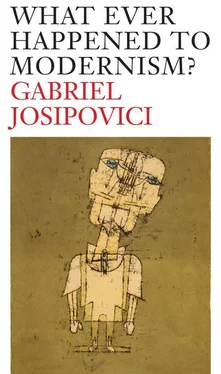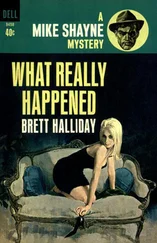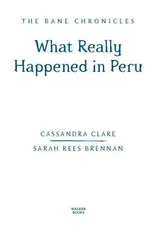But why ‘A delay in glass’? Partly of course because of the delay, which will stretch to infinity, between the desires of the Bachelors and the embrace of the Bride. But also because the work is so made that we cannot take it in at one go as we can all paintings, however complex, and however often we need to return to them to flesh out that initial ‘retinal’ impression. Because it is painted on glass and because the object is free-standing, as we look we see not only what is on the glass but also , through the glass, the room beyond and the other visitors looking at the art in this room. The peep-hole on the right-hand side of the lower panel is a further source of perplexity, for it implies an opaque surface, a closed door such as Duchamp will create for his last work, Etant Donnés (‘Being Given’), a wooden surface breached by a single tiny circular hole to which the eye can be put. Here, however, looking through the peep-hole, perhaps imagining that it will reveal some further, as yet unseen, vision, we see only what we could already see through the glass.
The work is extremely beautiful and meticulously made, Duchamp spending eight years transferring its elements — the Bride above and the ‘Bachelor Machine’ below — from sketches and preliminary works onto the two glass panels. The Large Glass , as it has come to be known, is also accompanied by boxes of detailed notes on physics, alchemy, metaphysics and much else, which — Duchamp being Duchamp — it is difficult to know whether to take seriously or as a spoof. They have of course, like the novels of Thomas Bernhard, to be taken both ways.
Today the original stands in the Philadelphia Museum of Fine Art, but there is a copy by Richard Hamilton in Tate Modern in London. Yet, unlike Fountain , which both does not exist anywhere and yet can exist in multiple sets, the Philadelphia Glass is unique, and the story of why it is unique is wonderfully Duchampian. Duchamp finished The Large Glass in 1921, in time for it to be exhibited at a show in New York. In transit from Philadelphia to New York, however, the two glass panels, which had been laid one on top of the other but not well enough insulated, ground against each other and, when the work was removed from its packaging on arrival, both panels were found to be shattered. Duchamp was immediately summoned to see if he could repair the damage, but when he looked at it he let out a whoop of joy, for the work now had a giant rainbow of cracks on the top panel mirrored by a similar pattern on the lower one. And one can see why he was so delighted. For years he had been trying to bring chance into his work, but chance brought in by the artist is never exactly chance. Now chance had led to an unexpected copulation in the back of a van and the result was a beautiful pattern which bound the top panel to the lower, while, amazingly, leaving all the main elements of the object perfectly visible and the whole still capable of standing up. He could not have asked for more from the gods.
Today far more visitors see Richard Hamilton's copy (made for the great English Duchamp exhibition of 1966, since the Large Glass could never be moved again) than ever see the original in Philadelphia. They think they are seeing it all, but of course they are not. The work they see is still very beautiful — but it is, somehow, dead. In Philadelphia, with its rainbow shatterings, it lives.
11. I Would Prefer Not To
When Bartleby is asked by his employer to do something, it will be remembered, he takes to answering: ‘I would prefer not to.’ In an interview with his dealer, Daniel-Henri Kahnweiler, Picasso recalled: ‘I well remember what I told [Braque and Gris] in the cubist room at the Indépendants, where there were some Gleizes and Metzingers: “I thought we'd enjoy ourselves a bit, but it's getting bloody boring again.”’ ‘The whole scaffolding of art bores me and gives me a headache’, remarks Thomas Mann's composer-hero, Adrian Leverkühn. And Beckett: ‘I speak of an art … weary of puny exploits, weary of pretending to be able, of being able, of doing a little better the same old thing, of going a little further along a dreary road.’ On a lighter note Salinger's Holden Caulfield begins his narrative:
If you really want to hear about it, the first thing you'll probably want to know is where I was born and what my lousy childhood was like and how my parents were occupied and all before they had me, and all that David Copperfield kind of crap, but I don't feel like going into it, if you want to know the truth. In the first place, that stuff bores me.
In all these cases doing something other people seem to have no difficulty in doing becomes an intolerable imposition, not because it is fiendishly difficult but because it is so boring. And what makes a thing boring? That it is meaningless, and that therefore spending time on it feels as though it were robbing one of a portion of one's life. None of the other toilers in Wall Street appears to feel this, but Bartleby does. Picasso does. Leverkühn does. Beckett does. Holden Caulfield does. In the case of Picasso that is a sign that he must move on, find something less boring, more meaningful, to do, but the others don't seem to have that option. For them it seems to be a question of either boring themselves to death or giving up altogether. Kafka's Hunger Artist is their patron saint. He has lain dying of hunger in the straw of his circus cage for days before he is noticed.
They poked into the straw with sticks and found him in it. ‘Are you still fasting?’ asked the overseer, ‘when on earth do you mean to stop?’ ‘Forgive me, everybody’, whispered the hunger artist; only the overseer, who had his ear to the bars, understood him. ‘Of course’, said the overseer, and tapped his forehead with a finger to let the attendants know what state the man was in, ‘we forgive you.’ ‘I always wanted you to admire my fasting’, said the hunger artist. ‘We do admire it’, said the overseer, affably. ‘But you shouldn't admire it’, said the hunger artist. ‘Well then we don't admire it’, said the overseer, ‘but why shouldn't we admire it?’ ‘Because I have to fast, I can't help it’, said the hunger artist. ‘What a fellow you are’, said the overseer, ‘and why can't you help it?’ ‘Because’, said the hunger artist, lifting his head a little and speaking with his lips pursed, as if for a kiss, right into the overseer's ear, so that no syllable might be lost, ‘because I couldn't find the food I liked. If I had found it, believe me, I should have made no fuss and stuffed myself like you or anyone else.’ These were his last words, but in his dimming eyes remained the firm though no longer proud persuasion that he was still continuing to fast.
The young Kafka dreamed of becoming a writer in order to escape the meaninglessness of the life he saw around him, in the first instance the life of his parents. Like all artists, he dreamed also, no doubt, of fame and glory. As he watched that fame and glory settle effortlessly on the shoulders of his friends Franz Werfel and Max Brod, while his own writing passed, for the most part, into obscurity, he struggled to understand what was happening. He knew their work was meretricious, sentimental, littered with cliché — yet was his own any better? Could the public be that wrong? Was it not rather his own work, obscure, crabbed, incomprehensible sometimes even to himself, that was without merit? After all, Werfel and Brod at least gave pleasure to thousands while his writing hardly even gave pleasure to himself. All he could say, at the end of his life, when ‘The Hunger Artist’ was written, was that he had had no option. His very body shied away from following the path of Werfel and Brod. Had his body accepted it he would have gone willingly down that path, but it didn't. It couldn't process food like that and so he couldn't eat it, and if the alternative was starvation, so be it. He mostly took no pride in this, had no wish to boast that they were passé , old hat, while his was the way of the future, as would one day be acknowledged. All he knew was that he could not do it. He who had not been able to find nourishment in a job, in a prospective marriage, who had imagined that writing would provide it, had come to see at last that writing could not help him either. More than that, as his anguished 1922 letter to Brod, from which I quoted at the start, suggests, he felt, like the young Wordsworth in the nut wood, that by writing he was desecrating, polluting, God's earth. All he had been was a burden and a disappointment to his family and friends and the sooner he was dead the better.
Читать дальше












